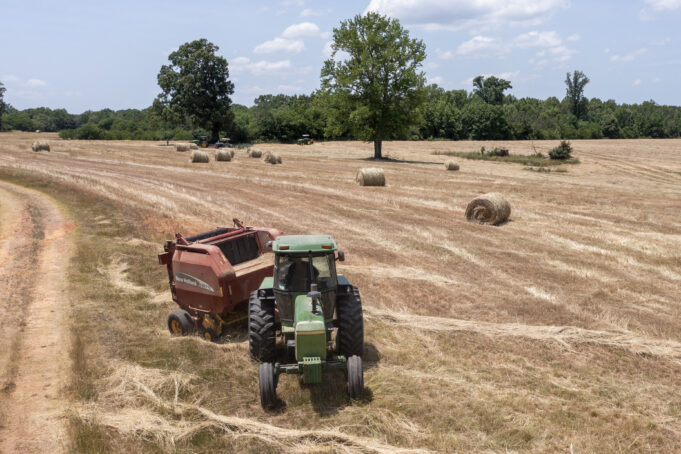At the turn of the century, there were one million Black farmers in America. They owned 16 million acres of land. Fast forward to 2024 and after decades of discrimination from banks and the federal government, there are only 50,000 full-time Black farmers with 3.5 million acres.
For nearly 100 years, the United States Department of Agriculture (USDA) restricted Black farmers from accessing federal subsidies, debt forgiveness, and other programs that served as a lifeline for the majority-White farmer population. This targeted restriction has decimated America’s Black farmers.
The Biden administration announced recently that it had disbursed $2 billion to thousands of farmers who faced discrimination. These payments come after years of delays and legal battles that left Black farmers struggling to survive, some of them losing land and having their farms confiscated.
“This is a very, very historic payout for Black farmers,” John Boyd, a fourth-generation Black farmer, founder and president of the nonprofit National Black Farmers Association (NBFA), told The Final Call. “I see it as a huge win for myself and the National Black Farmers Association that worked on this for nearly four decades.”
“We see this as a huge significance for farmers who are facing foreclosure,” Mr. Boyd said. “We have a lot of Black farmers in our organization that were facing foreclosure. So these payments are timely. It’s going to help them stay on the farm or help them improve their equipment, help them pay taxes.”
The USDA announced that it issued payments to 43,000 individuals in all 50 states, ranging from $10,000 to half a million. The NBFA held 60 meetings for members to understand the application process. They also sent 130,000 postcards to members explaining how to apply for this.
“This financial assistance is not compensation for anyone’s loss or the pain endured, but it is an acknowledgment by the department. And our hope is and the president’s hope is that this financial assistance will help many farmers stay on the farm, contribute to our nation’s food supply and continue to do what they love,” said USDA Secretary Tom Vilsack.
The payments come weeks after Mr. Boyd announced in May that he would not support President Biden’s re-election campaign. Mr. Boyd believed the president failed to keep his promises to help Black farmers.
In 2021, Black farmers were promised $4 billion in loan forgiveness funds as part of the Biden administration’s $1.9 trillion COVID-19 pandemic relief plan. As soon as that program was announced, White farmers filed lawsuits, and a temporary restraining order suspended the program.
Secretary Vilsack should have fought or challenged that court order explained Student Minister Dr. Ridgely Abdul Mu’min Muhammad, farm manager of the 1,600-acre farm in southwest Georgia owned by the Nation of Islam.
“The Equity Commission’s report in February of 2024 this year stated that Black farmers lost their land because of USDA policies,” he said.
He surmised that the recent $2 billion is a strategy to try and garner more Black votes leading up to the November presidential election.
The 2024 Equity Commission report stated, “Since the founding of USDA, historical exclusionary practices and policies have disproportionately impacted minority groups. As a result, generations of these groups have been placed at a disadvantage.
Several months after President Abraham Lincoln signed the legislation that created the USDA, he would issue the Emancipation Proclamation.”
“And from the onset, USDA neglected to support aspiring African American farmers and rarely addressed the additional challenges they faced. From enslaved labor toiling on plantations to Black farmers who pushed for the unfulfilled promise of ‘40 acres and a mule,’ African Americans have faced additional hurdles to participate in agriculture,” the report continued.
The current payouts come nearly two years after the Inflation Reduction Act of 2022 created a “race-neutral” fund to help any farmer who experienced discrimination from the federal government when applying for loans or trying to repay their debts.
Instead of contesting lawsuits that claimed the federal government should not distribute funds based on race, Democrats devised a more comprehensive plan that was less likely to face legal challenges.
However, the slow rollout of the program created a political nightmare for President Biden. Black farmers accused him of not fulfilling his promises to support them as they struggled to keep their farms.
“It’s not like working at McDonald’s, where you can get another job at Hardee’s. When you lose your farm, you lose your history,” Mr. Boyd said. “The loss is not just financial but also cultural and personal. It means losing your family cemetery, your identification, and all the things in the community that you live in. These losses are irreplaceable.”
While this payment is a good start, the farmers are still owed another $5 billion in debt relief.
“What President Biden has done for student debt forgiveness, I’m asking them to do the same for the $5 billion in debt relief owed to Black farmers. That will free up the remaining Black farmers that have land deeds of trust tied up with USDA. This is the land piece of it.”













